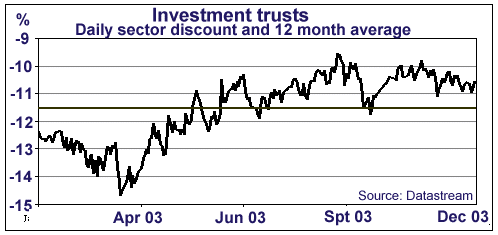|
Friday 6th February 2004 |
Text too small? |
The nadir was on March 12 when the MSCI world Index fell below 2,000, but this was followed by a strong rally, with risk aversion giving way to growing optimism of an economic recovery. As a result, cyclical and technology stocks rallied strongly at the expense of defensives.
Over 2003 as a whole, the MSCI World Index delivered a total New Zealand dollar return of 7.1%, although smaller companies were the place to be, with returns of 39.9% and 45.3% for the FTSE Small Cap and the Russell 2000 indices respectively in local currencies.
Japan and the Far East were also strong performers, but for New Zealand dollar investors the bounce in US markets was partly offset by a 24% decline in the US dollar against the NZ dollar.
As far as investment trust companies (ITCs) are concerned, 2003 was encouraging. A year ago we wrote "...retail demand seems certain to remain weak. As a result, it looks like being another tough year for the sector and further corporate activity is guaranteed. It is by no means all doom and gloom, however, and we believe there will be opportunities for investors to make money in 2003."
All of this proved correct, but our greatest concerns failed to materialise. In particular, the fall-out from events in the split capital market was not as bad as we had feared.
Few private client groups have abandoned investment trusts and the UK regulators did not over react in changes to the UK Listing Rules for ITCs.
Of course, the rise in markets was a key reason for improved sentiment, and the investment trust sector outperformed the MCSI World Index in New Zealand dollars by 20% points due to a combination of narrowing discounts, gearing and exposure to smaller companies/emerging markets. Having said that, there are still too many small poorly performing ITCs on wide discounts and it has remained difficult to raise new capital.
The low hanging fruit may have disappeared, but we believe there are still plenty of opportunities for investors to make money in 2004.
There remains value in some areas, notably Europe, and there are numerous well-managed ITCs in specialist asset classes such as the Far East, resources and private equity.
The growing independence of boards has put increasing pressure on investment trusts to perform with a dozen companies changing management groups in 2003. We expect this trend to continue.
During 2003, the average sector discount (excluding private equity funds) narrowed by around 1.8% to 10.5%. The discount widened in the first quarter to over 14%, but narrowed sharply during the market rally from April to September, briefly reaching single figures. The average discount for the sector over the year was 11.5%.

The sector average for 2003 disguises some significant discount movements within certain asset classes.
In 2003, discounts narrowed sharply in Japan, the Far East, emerging markets, biotechnology and Europe.
Global specialist funds also proved popular as investors favoured actively managed companies seeking positive absolute returns such as RIT Capital, The Independent ITC and British Empire Securities.
The best performing ITCs were those investing in the Far East/emerging markets, technology, smaller companies and resources.
The worst performing ITCs were dominated by low beta absolute return vehicles, as well as the funds of hedge funds (particularly those which did not hedge their US$ exposure).
The endowment funds were very weak, reflecting difficulties in the UK life market, and several private equity ITCs performed poorly (reflecting a weak IPO market).

No comments yet
VHP - Half year results announcement date and webcast details
Devon Funds Morning Note - 30 January 2026
AIA - Auckland Airport new board appointment
General Capital (GEN:NZ) Subsidiary General Finance Update
January 30th Morning Report
January 29th Morning Report
VSL - Date for 1H FY26 results announcement
January 28th Morning Report
IKE - Webinar Notification IKE Q3 FY26 Performance Update
VHP - Preliminary unaudited portfolio valuations 31 December 2025